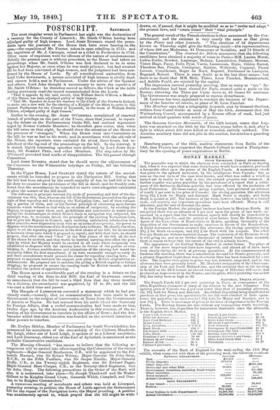POSTSCRIPT. a...AL
"That it appears by tho said record, that William Smith O'Brien, a Member of this House, has been adjudged guilty of high treason. "That Mr. Speaker do issue his warrant to the Clerk of the Crown in Ireland, to make out a new writ for the electing of a Knight of the Shire to serve in this present Parliament for the County of Limerick, in the room of William Smith O'Brien, adjudged guilty of high treason."
Earlier in the evening, Mr. Joule O'CorrNELL complained of renewed breach of privilege on the part of the Times; since that journal, in report- ing the debate on the Parliamentary Oaths Bill, had omitted arguments urged by Roman Catholic Members: he therefore gave notice, that when the bill came on that night, he should draw the attention of the House to the presence of "strangers." When the House went into Committee on the bill, he was as Ilad as his word; and in accordance with the old rule of the House, the reporters were excluded for about three hours, but re- admitted at the fag-end of the proceedings on the bill. In the interval, it is stated, highly interesting speeches were delivered by Lord Jousr Res- SELL, Sir ROBERT PEEL, and other Members. The step taken by Mr. O'Connell provoked loud marks of disapprobation. The bill passed through Committee.
Lord JoiDr RUSSELL stated that he should move the adjournment of the Commons for the Whitsuntide holydays on Friday, till the following Thursday.
In the Upper House, Lord STANLEY stated the nature of' the amend- ments which he intended to propose in the Navigation Bill. Seeing that the bill had been adopted by the small majority of ten, he had felt it to be his duty to examine the provisions of the bill in detail, and he frankly con- fessed that the amendments he intended to move were altogether calculated to alter the nature of the bill itself.
The difference in principle between his mode of proceeding and that of the Go- vernment was this that, whereas the bill of the Government proceeded on the prin- ciple of first repealing and destroying the Navigation-laws, and of then reenact- ing a _portion of them and on the further principle of retaliating upon foreign countries which refused to deal with us on terms of reciprocity, by enabling her Majesty to impose upon them such prohibitions and restrictions as would coun- tervail the disadvantages to which British trade or navigation was subjected, his principle was, to maintain intact the principle of the existing Navigation-laws, but to give her Majesty in Council, upon receiving satisfactory information that other countries were disposed to treat with us on terms of reciprocity, the power to dispense with the restrictions of the Navigation-laws in future. He should, therefore, object to all the repealing provisions in the first clause of the bill; for he intended to maintain those laws which it proposed to repeal; and with that view, he should propose, that after the word " that ' in the first clause of the bill, all the rest of the clause be omitted, and that words be inserted carrying into effect the prin- ciple by which her Majesty would be enabled in all cases where reciprocity was established to dispense with the existing laws in favour of the parties so esta- blishing it. .Certain modifications and relaxations of the existing law would im- mediately follow his first amendment, if he were successful enough to carry it; and those amendments would precede his clause for repealing existing laws. He proposed to maintain inviolate the support,now given to British shipbuilding es- tablishments. He proposed not to sanction the giving a British registry to foreign shipping; he proposed to secure the coast:dig trade for British vessels; and not to abolish the system of apprenticeship. -
The House spent a considerable part of the evening in a debate on the
third reading of the Rate-in-Aid the Earl of GLENGALL moving an amendment that the bill be read a third time that day three months. On a division, the amendment was negatived, by 37 to 29; and the bill was read a third time and passed.
The Marquis of LANSDOWNE corrected a statement which he had pre- viously made,—namely, that no communication had been made to our Government on the subject of intervention at Rome from the Governments of Austria or Naples. He had learned from his noble friend the Secretary for Foreign Affairs, that a verbal communication had been made to him, twelve days ago, by the Austrian Ambassador in this country, of the in- tention of his Government to interfere he the affairs of Rome; and the Am- bassador added that that intention was founded on the avowed intention of other powers to interfere.


























 Previous page
Previous page